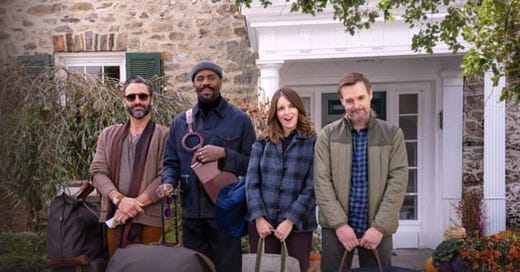My 5-minute narration:
My Hilo dance teacher wasn’t standing at the front of the class as she usually did every Monday. I asked my classmate what was going on and learned something that knocked the wind out of me: my teacher has been diagnosed with pancreatic cancer.
Since moving into my condo in Lower Queen Anne in 2018, my Hilo dance teacher has been more than just an instructor—she’s been my lifeline. We’re the same age (60+), and her twice-weekly, high-energy classes have helped me survive some of life’s roughest moments. She’s kept me physically strong and emotionally grounded through the lonely process of starting over after divorce, through the isolation of the pandemic (thanks to her video classes), and now through what feels like the end of democracy in this country. Her class has taken the place of my church, my therapist, and even my family.
The news stunned me. I felt heavy, helpless, and sad. Needing something to lift my mood—or at least help me escape it—I turned to Netflix.
I chose The Four Seasons, a comedy mini-series starring Tina Fey, Steve Carell, and Will Forte. A remake of an old Alan Alda movie, I think. I hoped it might make me laugh. Instead, it made me feel—deeply.
Tina Fey plays a character who reminded me a bit too much of myself: witty, brave, and sharp. So sharp, in fact, that she cuts the people she loves with the very insights she prides herself on. Steve Carell plays a man who seems to have it all—success, charm, stability. He and his wife take regular vacations with two other couples, including Tina Fey’s character and her sweet husband, played by Will Forte.
Each of the eight episodes is themed around a season—Spring, Summer, Autumn, and Winter—accompanied by Vivaldi’s “Four Seasons,” which brought back a lot of nostalgic feelings. (I used to play cello in my high school orchestra.) The familiar classical music threaded through the stories like happy memories do through my life.
The story begins with a disruption: Carell’s character announces he’s leaving his wife after 25 years. His reasons echoed almost word for word something a friend I met through Stitch (a social group for 50+ people) told me: “My wife has stopped growing. My daughter’s grown up enough that I can leave without damaging her. I just want to be happy for the rest of my life.”
And with that, the ripple effects begin.
The series doesn’t paint heroes or villains. Every character is layered and flawed, dispicable and lovable. Tragic and funny. Yes, the wife and daughter are devastated, and the friends are angry, but Carell’s pain is palpable too. You feel for everyone. By the end, nothing is neatly resolved. There’s no tidy “happily ever after”—just something honest and karmically unresolved, like life itself.
The show didn’t erase my sadness about my dance teacher. It didn’t offer comfort in the traditional sense. But it did what good art is supposed to do. The stories reminded me of an essential truth: life is painful, funny, and precious—because of each other.
My Hilo teacher has shaped my life in ways she probably doesn’t know. I can’t take away her illness. I can’t ease her suffering. Despite vigorous exercise and careful habits, we all grow older, slower, and more fragile. Each of us walks a solitary path through birth, aging, and death.
But we are never really alone.
Meaning is what we give to each other—through inspiration, kindness, and presence. And if I could say one thing to her, it would be this: Because of you, my life has meant more. And that matters.



